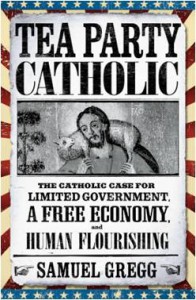 Fr. John Flynn, LC, has reviewed Tea Party Catholic: The Case for Limited Government, A Free Economy And Human Flourishing at Zenit. Flynn notes that the book is not about the current Tea Party political movement, but is tied to American history:
Fr. John Flynn, LC, has reviewed Tea Party Catholic: The Case for Limited Government, A Free Economy And Human Flourishing at Zenit. Flynn notes that the book is not about the current Tea Party political movement, but is tied to American history:
In his introduction Gregg explained that the book is not about the Tea Party movement or any particular group, but refers to the many millions of Americans who favor limited government.
Flynn also takes a look at what Gregg means by “limited government:”
The Catholic case for limited government does not mean being against all government, and it also does not mean that it is an endorsement of libertarianism or an Ayn Rand type philosophy, he stressed.
Gregg also admitted that there is a great range of views about the themes of government and the economy and social justice and that his book does not claim to be the only possible Catholic stance on these issues.
Gregg starts with a description of Charles Carroll, the only Catholic who signed the Declaration of Independence, and a strong supporter of freedom.
Carroll’s biographers, Gregg observed, all agree that his political and economic thought was influenced by his Catholicism and by what the Church had to say about the nature and limits of government.
The Catholic position on limited government differs significantly from the post-Enlightenment schools of thought, Gregg went on to explain.
It is based on what Benedict XVI termed in his encyclical Caritatis in Veritate, “integral human development,” or what others have termed, “integral human flourishing.”

